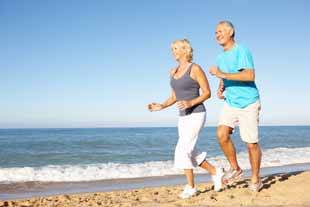What are the ACSM guidelines for aging and exercise ?
Almost all reputable health bodies around the world recommend that older adults undertake a minimum 150 mins/week or 30 mins on 5 days/week of moderate intensity physical activity to maintain their health and reduce the incidence of chronic disease.
This recommendation has been endorsed by the prestigious American College of Sports Medicine in it’s “position stand” in May 2009.
Individuals with existing chronic conditions should be as physically active as their health condition allows.
ACSM recommends that exercise should consist of three components:
- At least 150 mins of moderate intensity aerobic activity (at least 30mins on 5 days/week and up to 300 mins/week such as 60 mins on 5 days/week), especially those wishing to improve their current health status. The type of aerobic exercise chosen should be a form that reduces musculo-skeletal stress. These activities may consist of walking or light jogging on a soft surface, dancing and cycling. For individuals, such as those with arthritis in the lower limbs and others with limited tolerance of weight bearing activities better options may include stationary cycling, swimming or other water activities.
- Resistance or Strength training of moderate to vigorous intensity on at least 2 days/week and consisting of 8-10 exercises of 8-12 resistance exercises using large muscle groups.
- Flexibility exercises to increase joint of muscle ROM, especially for individuals with specific limitations in their joint ROM, such as those with arthritic changes. These exercises should be on at least 2 days/week and consist of slow, sustained stretches until moderate tension is felt during the stretch in the limiting muscle and joint structures.
Balance and resistance exercise should be incorporated into exercise programmes for individuals with an increased risk of falling or those with reduced bone density. These may include activities such as Tai Chi.
Go to YouTube/slowaging to see Ian talk further on exercise and slowing aging. Ian Gillam, PhD, FAAESS, exercise physiologist and nutritionist, is an accredited exercise physiologist and nutritionist at the Wellness Clinic, National Institute of Integrative Medicine. Ian’s special expertise is in the prescription of exercise and nutritional programmes to slow the progression of the chronic diseases associated with aging.
Follow Ian on Twitter.
Last Reviewed 10/Mar/2014

Latest posts by Ian Gillam (see all)
- How to start your strength training program - 14/01/12
- How hard should we exercise to slow aging? - 10/12/11
- Aging and exercise – ACSM guidelines - 07/07/11
